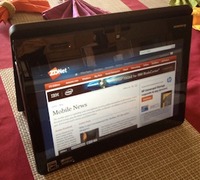Windows 8 slow sales: Yes it's the hardware


You may have seen stories online that detail the slow adoption of Microsoft's latest OS, Windows 8. Blame for the slump is cast far and wide with some claiming that Microsoft's competing with partners for the first time with its own PC hardware is rocking the Windows 8 boat.
That push by Microsoft with the Surface tablet is indeed making partners nervous and the result is a rash of tablets and hybrid notebooks aimed at exciting mainstream consumers. The problem is the buying public has never demanded radical hardware changes.
ZDNet's Larry Dignan has a reasoned look at why Windows 8 PCs are not flying off the shelf. He believes that Windows 8 is not polished enough to excite buyers (version 1.0 quality), plus the new PC hardware doesn't excite buyers.
See related: Why you should be skeptical of Chitika's market-share reports | Price and 'lukewarm critical reviews' put a damper on Microsoft Surface | Everything you need to know about Windows 8 upgrades (FAQ part 2)
Consumers have never demanded tablet/ laptops so there is no reason to believe these hybrid PCs will fly off the shelf.
I believe Larry is right to a certain degree but there is a simpler reason for the lackluster reception to this new Windows 8 hardware. Mainstream consumers, the ones I believe Windows 8 is designed to excite, have never asked for radical changes in PC hardware.
There are quite a few thin hybrid PCs aimed at bridging the gap between the popular tablet form and the laptop. These are intended to excite the buying public while providing full advantage of the touch capabilities of Windows 8. The problem is that is hard to do properly, perhaps even impossible.
I've tried a number of these hybrids and they don't make good tablets. They are too heavy and bulky and don't properly bridge the intended tablet/laptop gap. There is nothing there to excite consumers even if they had demanded such capability. More importantly, consumers have never demanded the feature, so there is no reason to believe these hybrid PCs will fly off the shelf even if they handled tablet functions well. Which they don't.
See also: Lenovo IdeaPad Yoga 13 hands on: Flexible laptop for flexible Windows 8 | Why I can't recommend the Surface RT for tablet shoppers | Surface RT hands-on: Not a good tablet, not a good laptop
Microsoft is obviously aiming Windows 8 at the mainstream market. That's the only market segment large enough to justify gambling on a total redesign of Windows 8. The enterprise market and tech-savvy segment were already entrenched in the Windows world so this redesign doesn't get Microsoft new customers in these groups. They would update to Windows 8 no matter what it looked like.
I agree with Larry that the hardware is playing a big role in the slow adoption of Windows 8, but not because it's too new and unpolished. I don't think the consumer on the street wants these innovative hardware designs. I think Microsoft has tried to do too much with Windows 8 in an attempt to reach new customers.
Existing Windows users will continue to buy Windows 8 products. It doesn't require radical new hardware to accomplish that goal. The attempt to grab new customers due to this new Windows 8 hardware will fail. Nobody has asked for this hardware so it solves no problem. That makes for a sticky situation for Microsoft and its partners with Windows 8 no matter how quickly the OS gets polished.